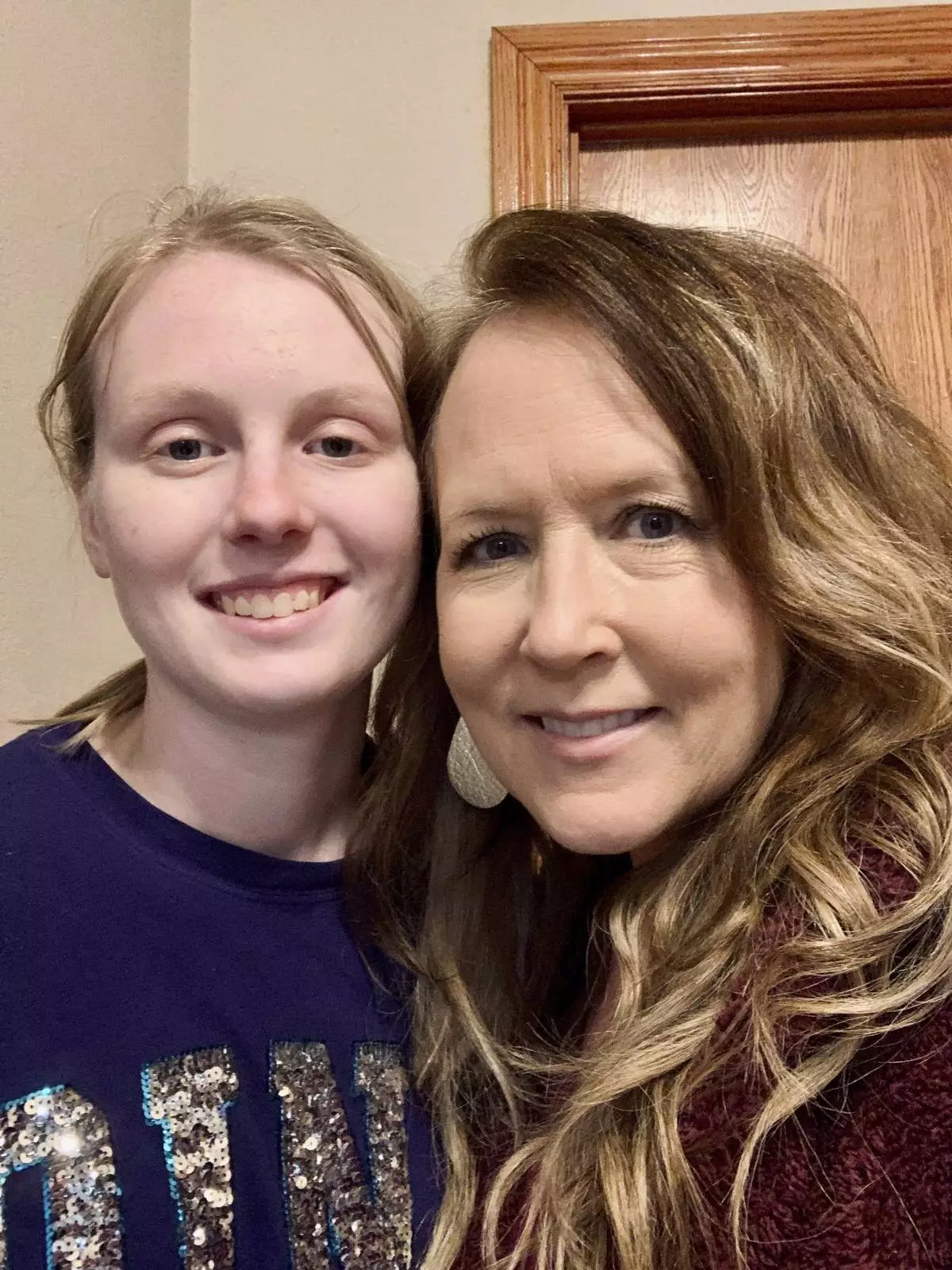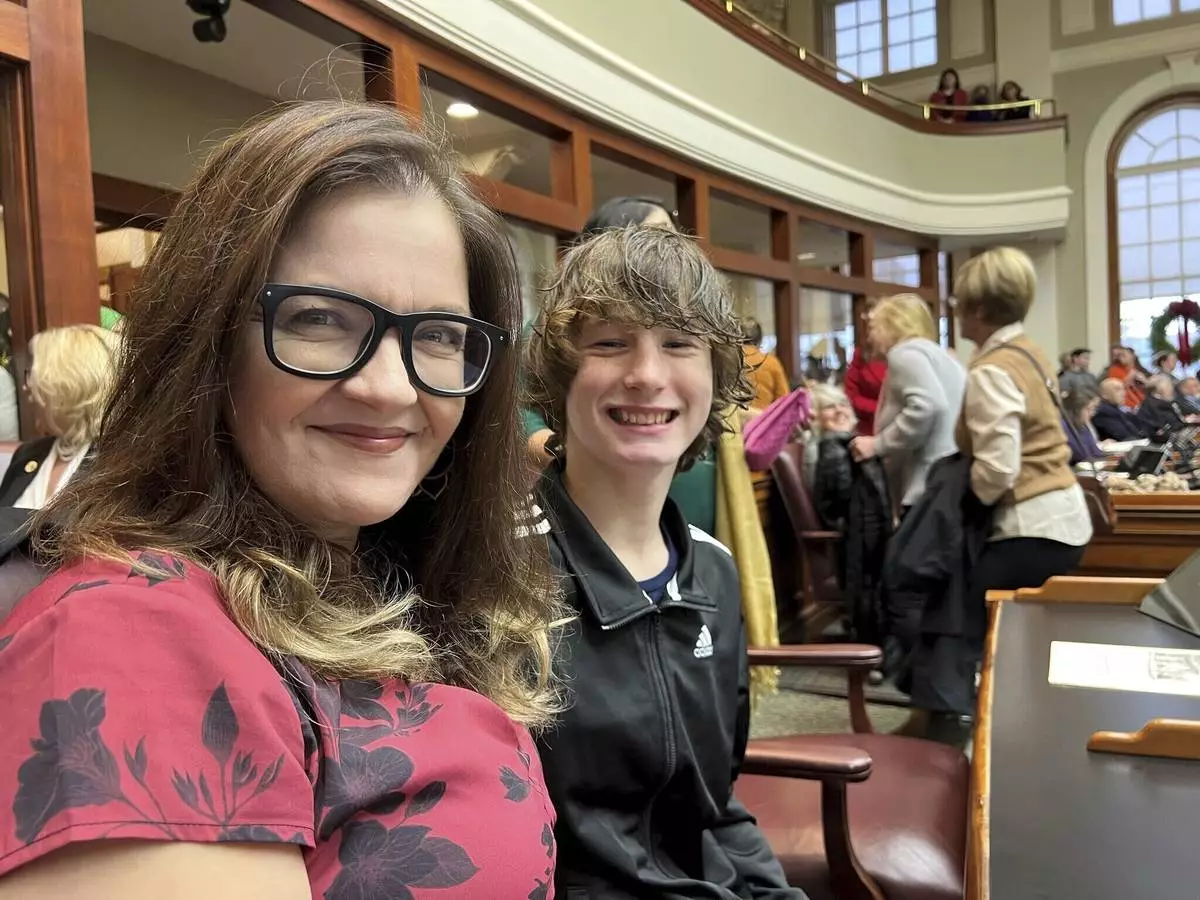JEFFERSON CITY, Mo. (AP) — By the time Jesse Fernandez turned 18, the federal government had paid out thousands of dollars in Social Security survivor's benefits because of the death of his mother. But Jesse's bank account was empty.
The money had all been used by Missouri's foster care system or relatives responsible for his care.
Click to Gallery
JEFFERSON CITY, Mo. (AP) — By the time Jesse Fernandez turned 18, the federal government had paid out thousands of dollars in Social Security survivor's benefits because of the death of his mother. But Jesse's bank account was empty.
Maine state Rep. Amy Roeder, left, poses for a photo with her son, Evan, in the Maine House of Representatives on Dec. 7, 2022, in Augusta, Maine. Roeder adopted her son from foster care and has sponsored legislation that would require the state to set aside foster children's Social Security survivor benefits for their unmet needs or future use. (Amy Roeder via AP)
Maine state Rep. Amy Roeder, left, poses for a photo with her family, from left to right, son Kurtis, their father Eric Schaefer, and son Evan on March 31, 2024, in Bangor, Maine. Roeder adopted her sons from foster care and has sponsored legislation that would require the state to set aside foster children's Social Security survivor benefits for their unmet needs or future use. (Amy Roeder via AP)
Jesse Fernandez, center, pets the family cat as he visits his former foster parents Jason and Joyce White Friday, May 17, 2024, in Independence, Mo. Fernandez was paid thousands of dollars of Social Security survivor's benefits because of the death of his mother, but by the time he turned 18, the money had all been used by the state of Missouri and Fernandez's relatives to pay for his foster care. (AP Photo/Charlie Riedel)
Jesse Fernandez, right, pets the family cat as he visits his former foster parents Jason and Joyce White Friday, May 17, 2024, in Independence, Mo. Fernandez was paid thousands of dollars of Social Security survivor's benefits because of the death of his mother, but by the time he turned 18, the money had all been used by the state of Missouri and Fernandez's relatives to pay for his foster care. (AP Photo/Charlie Riedel)
Jesse Fernandez, center, talks with his former foster parents Jason and Joyce White Friday, May 17, 2024, in Independence, Mo. Fernandez was paid thousands of dollars of Social Security survivor's benefits because of the death of his mother, but by the time he turned 18, the money had all been used by the state of Missouri and Fernandez's relatives to pay for his foster care. (AP Photo/Charlie Riedel)
Jesse Fernandez, center, stands with his former foster parents Jason and Joyce White Friday, May 17, 2024, in Independence, Mo. Fernandez was paid thousands of dollars of Social Security survivor's benefits because of the death of his mother, but by the time he turned 18, the money had all been used by the state of Missouri and Fernandez's relatives to pay for his foster care. (AP Photo/Charlie Riedel)
“I was shocked,” said Jason White, a foster parent to Fernandez.
“Those dollars are a big deal," he continued. “Had they been saved, or a chunk of it saved, he’d have money for a car and a first-time apartment."
For decades, states have routinely applied for Social Security survivor and disability benefits on behalf of foster children and then used that money to help cover the costs of foster care services. The tactic has saved states from having to spend millions of their own tax dollars on foster care programs.
But that's beginning to change under pressure from child advocates who contend the practice is both immoral and detrimental to foster children because it exhausts funds that could have helped them transition to adulthood.
More than a dozen states have made at least some sort of revisions to the practice since Maryland became the first to do so in 2018. Colorado became the latest in April when it enacted a law establishing a foster children’s list of rights, which stipulates that any benefits be used for their “individual needs.”
Similar measures have been proposed this year in numerous states as part of an “incredible explosion of reform efforts,” said Amy Harfeld, national policy director for the Children’s Advocacy Institute at the University of San Diego School of Law.
But change doesn't always come easy.
Missouri legislation that advocates touted as a national model failed to receive final approval Friday, despite previously passing both chambers. Supporters pointed to gridlock in the Republican-led Legislature and concerns about an unrelated child-custody amendment attached to the bill.
Both chambers of the Democratic-led Maine Legislature also approved a measure last month that would have prohibited the state from using foster children’s federal survivor benefits to reimburse its costs for foster care services. But the legislation failed to reach the governor’s desk because lawmakers weren't able to allocate the nearly $1.8 million necessary to compensate for the proposed change.
“There is a strong and growing interest to implement reforms,” said Meg Dygert, staff leader of the National Association of Public Child Welfare Administrators.
But “addressing this issue is not without its complexities,” she said. “To shift practices, child welfare agencies must work through significant financial, operational, technical, and legal challenges.”
An estimated 40,000 to 80,000 children in foster care either receive or are eligible for Social Security benefits, typically because of the death of a parent or their own disability, according to a report released last month by the Children’s Advocacy Institute. Those benefits typically pay hundreds of dollars a month per child, which adds up to millions of dollars annually for states.
In Missouri, the Children’s Division spent more than $9.3 million last year on foster care services from the accounts of about 1,400 foster children who received Social Security benefits, according to legislative research staff.
Those federal disability payments would have amounted to an estimated $123,000 over 13 years for Alexus Brandon, her foster mother Brenda Keith said. But Brandon, 21, received none of that when she aged out of Missouri's foster care system because the state had used it all, Keith said.
Brandon now receives monthly disability checks, but she has fallen behind on rent payments and can’t afford a car, making it harder to get a job.
Had the state set aside some of her childhood disability benefits for future use, “it would have helped me start out my life,” Brandon said.
The Missouri legislation would have required the Children's Division to apply for Social Security benefits on behalf of eligible foster children but prohibited the agency from using that money for required foster care expenses. Instead, the benefits would have been set aside for children when they age out of foster care or spent on “unmet needs” such as school, transportation or other items.
A similar measure passed the Republican-led Arizona Legislature last year and was signed into law by Democratic Gov. Katie Hobbs. At the time, the state Department of Child Safety said it was collecting about $6.2 million annually in Social Security and veterans' survivor benefits on behalf of foster children and spending around $4 million of that on foster care services.
“We shouldn’t be funding government off the backs of abused children,” said Kendall Seal, vice president of policy at the Center for the Rights of Abused Children, which backed the Arizona and Missouri measures.
Oregon Gov. Tina Kotek, a Democrat, also signed a law last year barring the state from using children's benefits to cover the state's costs of food, clothing, housing and daily supervision of foster children. It instead directs those funds to savings accounts for children's personal needs, including education and future housing expenses.
New Mexico's children's department announced last year it would no longer tap into foster children's Social Security benefits and instead place that money in a trust for children. Massachusetts' children's agency said earlier this year it also was ending the use of foster children’s Social Security benefits to cover its costs.
Lawmakers in Missouri and Maine said they would try again next year to pass legislation limiting the state's use of foster children's federal benefits.
The Maine measure was sponsored by Democratic Rep. Amy Roeder, who adopted two sons from foster care, including one who receives Social Security survivor's benefits because his biological father died. While he was in the foster care system, her son didn't receive any of those monthly benefit payments. But Roeder said she is now saving the funds until he is an adult to help pay for higher education or housing.
“Money is a cold comfort when you lose somebody, but it’s something," Roeder said, "even if it’s just a little bit of a boost to get you started.

Brenda Keith, right, and her foster daughter, Alexus, pose for a photo on March 21, 2022, in Mansfield, Mo. States have for decades been using foster children's federal Social Security benefits to help cover the costs of state services. The practice has saved states millions of dollars. But that's beginning to change in some states under pressure from child advocates who contend it is immoral and detrimental to kids. (Brenda Keith via AP)

Maine state Rep. Amy Roeder, left, poses for a photo with her son, Evan, in the Maine House of Representatives on Dec. 7, 2022, in Augusta, Maine. Roeder adopted her son from foster care and has sponsored legislation that would require the state to set aside foster children's Social Security survivor benefits for their unmet needs or future use. (Amy Roeder via AP)

Maine state Rep. Amy Roeder, left, poses for a photo with her family, from left to right, son Kurtis, their father Eric Schaefer, and son Evan on March 31, 2024, in Bangor, Maine. Roeder adopted her sons from foster care and has sponsored legislation that would require the state to set aside foster children's Social Security survivor benefits for their unmet needs or future use. (Amy Roeder via AP)

Jesse Fernandez, center, pets the family cat as he visits his former foster parents Jason and Joyce White Friday, May 17, 2024, in Independence, Mo. Fernandez was paid thousands of dollars of Social Security survivor's benefits because of the death of his mother, but by the time he turned 18, the money had all been used by the state of Missouri and Fernandez's relatives to pay for his foster care. (AP Photo/Charlie Riedel)

Jesse Fernandez, right, pets the family cat as he visits his former foster parents Jason and Joyce White Friday, May 17, 2024, in Independence, Mo. Fernandez was paid thousands of dollars of Social Security survivor's benefits because of the death of his mother, but by the time he turned 18, the money had all been used by the state of Missouri and Fernandez's relatives to pay for his foster care. (AP Photo/Charlie Riedel)

Jesse Fernandez, center, talks with his former foster parents Jason and Joyce White Friday, May 17, 2024, in Independence, Mo. Fernandez was paid thousands of dollars of Social Security survivor's benefits because of the death of his mother, but by the time he turned 18, the money had all been used by the state of Missouri and Fernandez's relatives to pay for his foster care. (AP Photo/Charlie Riedel)

Jesse Fernandez, center, stands with his former foster parents Jason and Joyce White Friday, May 17, 2024, in Independence, Mo. Fernandez was paid thousands of dollars of Social Security survivor's benefits because of the death of his mother, but by the time he turned 18, the money had all been used by the state of Missouri and Fernandez's relatives to pay for his foster care. (AP Photo/Charlie Riedel)
WEST PALM BEACH, Fla. (AP) — Israeli Prime Minister Benjamin Netanyahu worked to mend ties with Republican presidential candidate Donald Trump on Friday and offered measured optimism about progress toward a cease-fire deal for Gaza as he neared the end of a contentious U.S. visit that put on display the growing American divisions over support for the Israeli-Hamas war.
At Trump's Florida Mar-a-Lago estate, where the two men met face-to-face for the first time in nearly four years, Netanyahu told journalists he wanted to see U.S.-mediated talks succeed for a cease-fire and release of hostages.
“I hope so,” Netanyahu said, when reporters asked if his U.S. trip had made progress. While Netanyahu at home is increasingly accused of resisting a deal to end the 9-month-old war to stave off the potential collapse of his far-right government when it ends, he said Friday he was "certainly eager to have one. And we’re working on it.”
As president, Trump went well beyond his predecessors in fulfilling Netanyahu’s top wishes from the United States. Yet relations soured after Netanyahu became one of the first world leaders to congratulate Joe Biden for his 2020 presidential victory, which Trump continues to deny.
The two men now have a strong interest in restoring their relationship, both for the political support their alliance brings and for the luster it gives each with their conservative supporters.
A beaming Trump was waiting for Netanyahu on the stone steps outside his private club and residence in Palm Beach, Florida. He warmly clasped the hands of the Israeli leader.
“We’ve always had a great relationship,” Trump insisted before journalists. Asked as the two sat down in a muraled room for talks if Netanyahu’s trip to Mar-a-Lago was repairing their bond, Trump responded, “It was never bad.”
For both men, Friday’s meeting was aimed at highlighting for their home audiences their depiction of themselves as strong leaders who have gotten big things done on the world stage, and can again.
Netanyahu’s Florida trip followed a fiery address to a joint meeting of Congress on Wednesday that defended his government’s conduct of the war and condemned American protesters galvanized by the killing of more than 39,000 Palestinians in the conflict.
On Thursday, Netanyahu had met in Washington with Biden and Vice President Kamala Harris, who appears on track to becoming the new Democratic presidential nominee after Biden decided to step out of the race. Both pressed the Israeli leader to work quickly to wrap up a deal to bring a cease-fire and release hostages held by Hamas.
Trump’s campaign said he pledged in Friday's meeting to “make every effort to bring peace to the Middle East” and combat antisemitism on college campuses if American voters elect him to the presidency in November.
Netanyahu handed Trump a framed photo that the Israeli leader said showed a child who has been held hostage by Hamas-led militants since the first hours of the war. “We’ll get it taken care of,” Trump assured him.
In a speech later Friday before a group of young Christian conservatives, Trump said he also asked Netanyahu during their meeting how “a Jewish person, or a person that loves Israel” can vote for Democrats.
He also laced into Harris for missing Netanyahu's speech and claimed she “doesn’t like Jewish people” and “doesn’t like Israel." Harris has been married to a Jewish man for a decade.
For Trump, the meeting was a chance to be cast as an ally and statesman, as well as to sharpen efforts by Republicans to portray themselves as the party most loyal to Israel.
Divisions among Americans over U.S. support for Israel’s war against Hamas in Gaza have opened cracks in years of strong bipartisan backing for Israel, the biggest recipient of U.S. aid.
For Netanyahu, repairing relations with Trump is imperative given the prospect that Trump may once again become president of the United States, which is Israel’s vital arms supplier and protector.
One gamble for Netanyahu is whether he could get more of the terms he wants in any deal on a Gaza cease-fire and hostage release, and in his much hoped-for closing of a normalization deal with Saudi Arabia, if he waits out the Biden administration in hopes that Trump wins.
“Benjamin Netanyahu has spent much of his career in the last two decades in tethering himself to the Republican Party,” said Aaron David Miller, a former U.S. diplomat for Arab-Israeli negotiations, now a senior fellow at the Carnegie Endowment for International Peace.
For the next six months, that means “mending ties with an irascible, angry president," Miller said, meaning Trump.
Netanyahu and Trump last met at a September 2020 White House signing ceremony for the signature diplomatic achievement of both men’s political careers. It was an accord brokered by the Trump administration in which the United Arab Emirates and Bahrain agreed to establish normal diplomatic relations with Israel.
For Israel, it amounted to the two countries formally recognizing it for the first time. It was a major step in what Israel hoped would be an easing of tensions and a broadening of economic ties with its Arab neighbors.
In public postings and statements after his break with Netanyahu, Trump portrayed himself as having stuck his neck out for Israel as president, and Netanyahu paying him back with disloyalty.
He also has criticized Netanyahu on other points, faulting him as “not prepared” for the Oct. 7 Hamas attacks that started the war in Gaza, for example.
In his high-profile speech to Congress on Wednesday and again Friday at Mar-a-Lago, Netanyahu poured praise on Trump, calling the regional accords Trump helped broker historic and thanking him “for all the things he did for Israel.”
Netanyahu listed actions by the Trump administration long-sought by Israeli governments — the U.S. officially saying Israel had sovereignty over the Golan Heights, captured from Syria during a 1967 war; a tougher U.S. policy toward Iran; and Trump declaring Jerusalem the capital of Israel, breaking with longstanding U.S. policy that Jerusalem's status should be decided in Israeli-Palestinian negotiations.
“I appreciated that,” Trump told “Fox & Friends” on Thursday, referring to Netanyahu's praise.
Trump has repeatedly urged that Israel with U.S. support “finish the job” in Gaza and destroy Hamas, but he hasn’t elaborated on how.
Natalie Melzer in Tel Aviv, Israel, Adriana Gomez Licon in West Palm Beach, Florida, and Jill Colvin in New York contributed. Knickmeyer reported from Washington. Price reported from New York.
Follow the AP's coverage of the 2024 election at https://apnews.com/hub/election-2024.

Republican presidential candidate former President Donald Trump speaks at the Turning Point Believers' Summit, Friday, July 26, 2024, in West Palm Beach, Fla. (AP Photo/Alex Brandon)

Republican presidential candidate former President Donald Trump listens as he meets with Israeli Prime Minister Benjamin Netanyahu at his Mar-a-Lago estate, Friday, July 26, 2024, in Palm Beach, Fla. (AP Photo/Alex Brandon)

Republican presidential candidate former President Donald Trump meets with Israeli Prime Minister Benjamin Netanyahu at his Mar-a-Lago estate, Friday, July 26, 2024, in Palm Beach, Fla. (AP Photo/Alex Brandon)

Republican presidential candidate former President Donald Trump speaks while meeting with Israeli Prime Minister Benjamin Netanyahu at his Mar-a-Lago estate, Friday, July 26, 2024, in Palm Beach, Fla. (AP Photo/Alex Brandon)

Israeli Prime Minister Benjamin Netanyahu speaks while meeting with Republican presidential candidate former President Donald Trump at his Mar-a-Lago estate, Friday, July 26, 2024, in Palm Beach, Fla. (AP Photo/Alex Brandon)

Republican presidential candidate former President Donald Trump meets with Israeli Prime Minister Benjamin Netanyahu, right, at his Mar-a-Lago estate, Friday, July 26, 2024, in Palm Beach, Fla. (AP Photo/Alex Brandon)

Republican presidential candidate former President Donald Trump meets with Israeli Prime Minister Benjamin Netanyahu at his Mar-a-Lago estate, Friday, July 26, 2024, in Palm Beach, Fla. (AP Photo/Alex Brandon)

Republican presidential candidate former President Donald Trump meets with Israeli Prime Minister Benjamin Netanyahu at his Mar-a-Lago estate, Friday, July 26, 2024, in Palm Beach, Fla. (AP Photo/Alex Brandon)

FILE - President Donald Trump, right, meets with Israeli Prime Minister Benjamin Netanyahu in the Oval Office, Sept. 15, 2020, at the White House in Washington. Trump is due to talk face-to-face with Netanyahu for the first time in nearly four years. The meeting Friday, July 26, 2024, at Mar-a-Lago will mend a break that has lasted since 2021. Trump at the time blasted Netanyahu for being one of the first leaders to congratulate President Joe Biden for his election victory. (AP Photo/Alex Brandon, File)
































